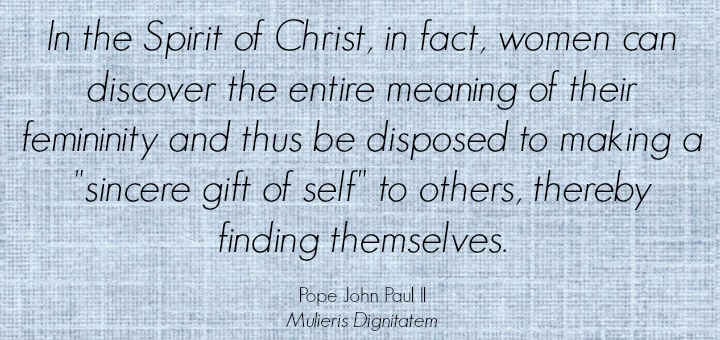I recently read and wrote about St. John Paul II’s apostolic letter Mulieris Dignitatem. It was a timely read, as May is the month we celebrate both mothers in general and our own Mother of the Church, Mary. But it was also timely for me because I have been reflecting on the idea of motherhood in culture today. The letter was such a life-giving exhortation to me of “the dignity and vocation of women,” and one of the main themes that runs throughout is the fact that every woman is created for, and is therefore called to, motherhood.
It doesn’t matter if you are 6, 16, 36, or 60. It doesn’t matter if you are poor or rich. It doesn’t matter if you are single, married, or consecrated to religious life. It doesn’t matter if you are blessed with many biological children or struggle with life-long infertility. Every woman was created with the capacity to birth new life. Not every woman will birth or raise children, and those who do will not do so in every stage of their lives.
Regardless of the stage of life, or the limitations of our circumstances, or the particular vocational call — every woman is called to spiritual motherhood throughout her entire life, and this truly is our unique and defining vocation as female human beings. We have lost the significance of this purpose. As a culture, we view motherhood in so many mixed up and problematic ways. But our view of fatherhood is skewed as well. Why? Because I think we have missed the point of being human in our world today.
We don’t view motherhood or fatherhood in their proper dignified realities because we don’t live as though human beings are the most important things in our world. If they are the most important — more than all of our empires and achievements — then the spiritual, emotional and physical care of those humans is the most important work that we do as individuals. I firmly believe that our daily activities and actions, both as individuals and a collective culture, devulge what we really value. Quite frankly, many daily activities in our culture reveal a long list of things that come before people: meetings, making money (always more), fame, our phones, our careers, our homes, our cars, our vacations, our achievements, our schedules, our comfort…the list goes on.
But God created human beings in his own image, which means that every human being on this planet is an image-bearer of his or her Creator. If that is true, that people are made in the image of God, then the care of people — the mothering and the fathering of them — is the most important human activity of our lives; and it should be the activity that takes precedence over every other. In his letter, JPII points to the second vatican council’s admonition that our self-discovery (as men or women) comes from “giving ourselves away.”

As women, we give ourselves away — and therefore discover ourselves — through our maternal vocation. the “mothering” isn’t limited to a parental role or whether or not we have children. We see mothering in an older sister teaching things to younger siblings. We see the beauty of spiritual motherhood in the teenage girl who reaches out to comfort a peer who just experienced loss. It is evident when an older woman reaches out with advice and a listening ear to the post-college girl trying to find her way in the world. It is in the care of those who are sick. It is in the smile, eye contact, and meal that you give to a homeless person. It is in the companionship of a woman who visits the homebound and those in nursing homes.
Our biological propensity for motherhood is a powerful sign of our call to be mothers to other human beings in ways that preserve, promote, and proclaim their dignity as image-bearers of their Creator. No tasks in our lives should rank above human flourishing. No achievements can bring us fulfillment equal to that we experience in giving ourselves away to others. If we aren’t about caring for other people, then we aren’t about anything. And if we don’t believe that every human being, at every stage of life, is precious and dignified, then we won’t value motherhood as we should.
